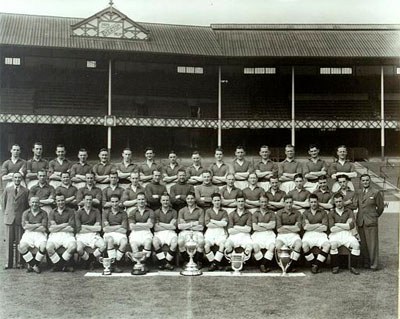Everton FC

|
|
Everton squad in the season 1939-1940.
Photo: Dr. David France |
Everton FC — History, Achievements & Evolution
Founding Years (1878)
Everton was founded in 1878 by members of St. Domingo’s Methodist Church. Originally created to keep parishioners active during winter, the club quickly grew in popularity and soon adopted its famous name — Everton FC. By the late 19th century, the Toffees had already established themselves as one of the strongest clubs in the emerging English game.
A Founding Member of the Football League
In 1888, Everton became one of the founding members of the English Football League. The club’s ambition, strong ownership, and growing support placed them firmly among the early giants of the sport. This era saw rapid growth in fan culture, local rivalries, and a football identity that would shape the club for decades.
Anfield Roots & Move to Goodison Park
Few people today realize that Everton originally played at Anfield — the ground now synonymous with Liverpool FC. After a dispute over rent with the club’s landlord, Everton left the stadium in 1892, prompting the formation of Liverpool FC. Everton moved to Goodison Park, one of the first purpose-built football grounds in England, and it became their permanent home for over 130 years.
Early Success & First League Titles
Everton won their first league championship in 1890–91. The club built a reputation for talented teams, loyal supporters, and consistent top-flight performances. Across the next several decades, Everton remained one of the country’s leading sides, adding more league titles and FA Cup success.
The Dixie Dean Era — A Legend is Born
The 1920s and 1930s brought Everton’s most iconic figure: Dixie Dean. His goal-scoring exploits remain unprecedented, especially his stunning 60 league goals in the 1927–28 season — a record that may never be broken. Dean’s leadership helped Everton win the league in 1928 and again in 1932, securing his eternal status in football history.
Post-War Strength & Cup Triumphs
After World War II, Everton gradually rebuilt, winning titles in 1963 and capturing the FA Cup in 1966. This period featured electrifying players and a proud footballing identity rooted in hard work, spirit, and loyal Merseyside support.
Golden Era — The Howard Kendall Years (1980s)
The club reached extraordinary heights under manager Howard Kendall during the 1980s. Everton became one of Europe’s best sides, winning the league titles in 1985 and 1987, lifting the FA Cup, and capturing the 1985 European Cup Winners’ Cup. The team of this era, featuring Peter Reid, Neville Southall, Kevin Sheedy, and Graeme Sharp, remains beloved by fans.
Premier League Era — Mixed Fortunes
Everton entered the Premier League era with challenges, fluctuating between relegation battles and strong top-half finishes. Despite difficulties, the club remained competitive and produced stars such as Wayne Rooney, Tim Cahill, Mikel Arteta, Leighton Baines, and Romelu Lukaku.
Recent Challenges & Rebuilding
The late 2010s and early 2020s were difficult years for Everton, marked by managerial changes and financial issues. However, strong fan support and strategic rebuilding have kept the club fighting to preserve its long-standing Premier League status.
A New Chapter — The Bramley-Moore Dock Stadium
Everton is entering a new era with the construction of a state-of-the-art stadium at Bramley-Moore Dock. This monumental project represents the club’s ambition to grow commercially, modernize facilities, and begin a new chapter while honoring its rich history.
Everton’s crest features the famous Prince Rupert’s Tower — a symbol of strength, resilience, and the community origins that define the club’s character. The Latin motto “Nil Satis Nisi Optimum” means “Nothing but the best is good enough.”
